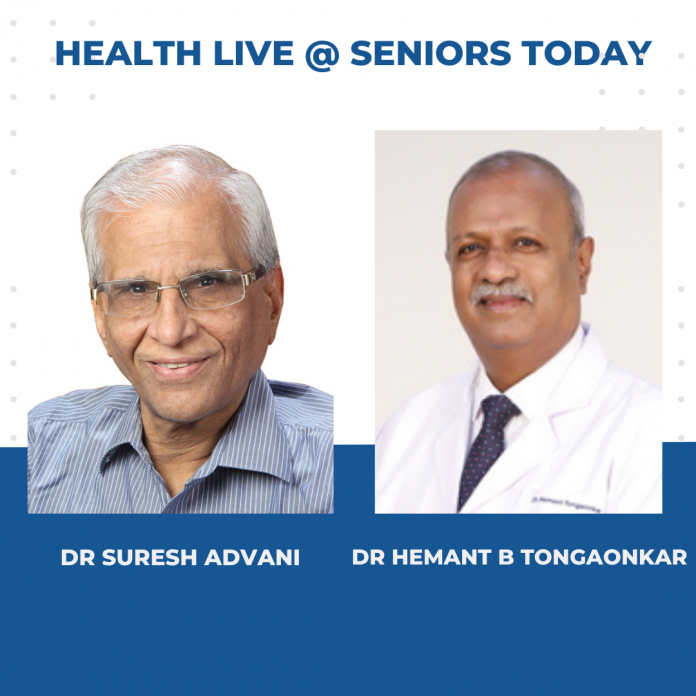On Feb 5, 2022, Seniors Today hosted its weekly Health Live webinars with the top cancer specialists- Dr Suresh Advani and Dr Hemant B Tongaonkar from Nanavati Hospital and they spoke about Cancer Care in Senior Citizens.
About Dr Suresh Advani
Dr Suresh Advani is one of the foremost doctors and oncologists in the country. He is the recipient of the Padma Bhushan and Padma Shri, the second and third highest civilian awards in the country. He received the Dhanvantri and Dr BC Roy Awards as well as a Lifetime Achievement in Oncology.
Dr Advani is an MBBS, MD (General Medicine), FICP, FNAMS and is Fellow in Medical Oncology.
He has 46 years of experience and he pioneered the bone-marrow transplant for leukaemia
About Dr Hemant B Tongaonkar
Dr Hemant B Tongaonkar is Director – Urology & Gynaecology Oncosurgery & Head – Surgical Oncology, at the Nanavati Max Hospital of Mumbai. He has more than 36 years of experience.
He was Head, Department of Surgical Oncology and Consultant Urologic & Gynaecologic Oncologist, at PD Hinduja National Hospital & Research Centre, Mumbai from January 2012-September 2021. He was Professor & Head, Department of Surgical Oncology and Head, Department of Urologic & Gynaecologic Oncology, Tata Memorial Hospital 2002-2012 and Consultant Urologic & Gynaecologic Oncologist, Tata Memorial Hospital 1992-2012.
Dr Tongaonkar has done his MBBS and MS in General Surgery at the University of Mumbai. He is Fellow of International College of Surgeons and Fellow of Association of Surgeons of India. He received the Urology Gold Medal of the Urological Society of India West Zone for outstanding contribution to the field of Urology in India 2015 and the Dr PV Rao Gold Medal of Urological Society of India for outstanding contribution to the specialty of Urologic Oncology in India 2016.
As the age advances the chances of getting a malignancy get higher. The reason is simple – as the age advances a lot of gene mutations occur in the body. And it is this gene mutation that leads to loss of control of different cells in the body and therefore they start multiplying.
There are certain malignancies that happen only in the senior age group, prostate carcinoma for example.
The reason why carcinomas are more common in senior citizens is because they have been exposed to carcinogens all their life.
It is believed that cancer is a lifestyle disease. And your food, exercise habits and your environment have a major role to play in it.
Even though the seniors have been exposed to these carcinogenic agents for a long duration, there are a few changes that they can still make:-
- Avoid consuming processed food and red meat as much as you can.
- Obesity and lack of physical disorders are directly linked to cancer and this can be changed.
- Vaccines against hepatitis A and B can be taken to prevent hepatocellular carcinoma.
- Avoid stress and stressful environments.
Some of the most common types of cancers that are seen in the seniors include:
- Males – Mouth cancer
- Prostate cancer
- Cancer of the voice box
- Cancer of the lungs
- Oesophageal carcinoma
There are of course geographical factors that also have a major role to play in the incidence
Female-
- Breast cancer- has the highest incidence. Occurs more commonly after the age of 60
- Uterine and cervical cancer
All elderly women should go for a regular checkup despite having no symptoms.
Uterine cancers present with bleeding, even a single episode of bleeding post menopause should be taken seriously
Cervical carcinoma usually presents with no symptoms
Ovarian carcinoma is also called the whispering cancer
Among all the cancers, only 2-3% of the cancers are hereditary.
It is not recommended to do gene testing in siblings or children since it is not a wise way to use the technology we have.
However, if your mother tests positive for the gene, it is advised that the children or siblings get tested to see if they are predisposed to it.
The potential for any cancer to spread depends on other biological factors and not age.
In young children and adults, the bone marrow is active hence you can give them a high dose of chemotherapy and they still recover. However, with seniors, we need to modify our doses and drugs in such a way that we get optimum action without causing toxicity.









Very good information. Cautioning the senior citizens. I will be happy to listen about Prostate cancer etc. in near future.
Comments are closed.